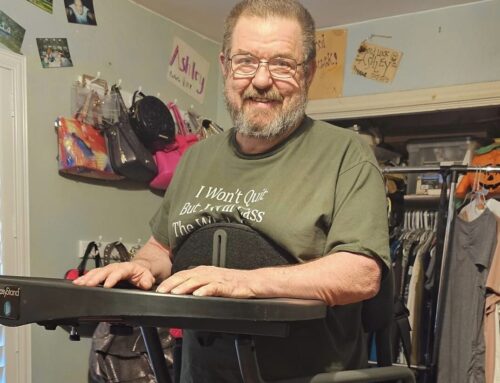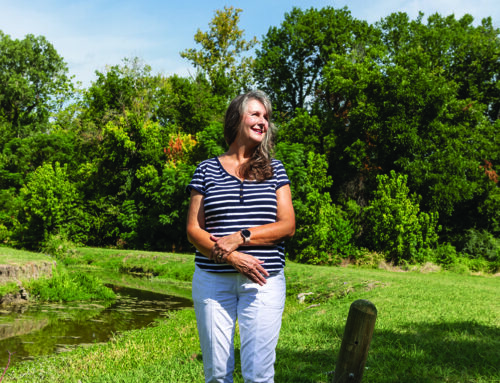Ken Chambers has done about everything he wants to do, except see again.
The neighborhood resident has a rare eye disease that causes deterioration of the retina and made him go blind several years ago.
But Chambers doesn’t see himself as disabled.
“The doctors can’t do anything about it. I can’t do anything about it,” Chambers says. “You accept it and go on. It doesn’t have to end your life.”
Chambers is a musician and a writer. After serving in the military for 20 years, he returned to school and earned a degree in rehabilitation science from UT’s Southwestern Medical Center. Now he volunteers at the Texas Scottish Rite Hospital three days a week.
Chambers’ favorite job is being a patient care extender, performing some of the non-critical-care duties of nurses. To become an extender, Chambers was required to complete a training course prior to receiving a name tag adorned with a heart.
“I finished the training on Friday, and I couldn’t wait until Monday to get my heart,” Chambers says. “For all the badges and medals I have won, nothing has meant more to me than that little heart. That was the ultimate.”
As part of his duties, Chambers transports, feeds and grooms patients.
“I always tell them that we have to be careful because the speed limit in the hall is 50. That gets their attention, and they relax,” Chambers says. “That’s what it is all about.” Chambers, 52, grew up in Dallas. He joined the Army when he was 16 by forging his mother’s signature on the registration card.
“I didn’t get caught until four years later,” Chambers says. “By that time, I was a career soldier. When they found out, I was discharged and re-enlisted the same day.”
After serving a tour in Vietnam in 1967 and 1968, Chambers was stationed in Europe. There he learned to play the left-handed guitar, bass guitar, piano, organ and drums by ear. In the early 1970s, Chambers and a few friends formed the Caravan Drifters and introduced country-western music to Europe.
“My band and I played back-up for all the American stars who would come over on tour,” Chambers says. “We would play two to four shows a night and travel with them in the buses.”
He played with Johnny Cash, Kitty Wells, Ernest Tubb and Don Williams. But the Caravan Drifters were hits not just as a back-up band. They cut several albums and had a few top-five hits in Europe.
“We were asked to be guests on a TV show called Disco, which was what everyone was listening to at the time. It was similar to American Bandstand,” Chambers says.
“We taped the show, then watched it the next day on television and found out later that over 18 million people had seen it. It was a trip.”
It was about this time Chambers learned of his eye disease. He saw a black, pencil-lead-sized dot on objects and would try to wipe if off. Unable to remove the dot, he went to the doctor in September 1976. He was diagnosed with Stargardt’s Disease, which causes the loss of center vision.
“I was devastated. The only thing I had ever wanted to do was be a soldier and I couldn’t do that anymore,” Chambers says.
“I went through the typical five stages that a person goes through; denial, anger, frustration, bargaining and acceptance. After I reached that point, I didn’t have a choice, I came back to the United States.”
That was in 1977. He went through low-vision rehabilitation that helped him deal with his loss of sight. He became interested in studying rehabilitation and decided to go back to school.
“I got to write several assignments for English, and I used them like therapy,” Chambers says. “They helped me get things off my chest.”
He still plays all his instruments, and he uses a closed-circuit television and a large screen computer to help him read. He depends upon public transportation to get around. But he refuses to use a cane to walk.
“I don’t want people to feel sorry for me,” Chambers says. “They don’t need to.”





